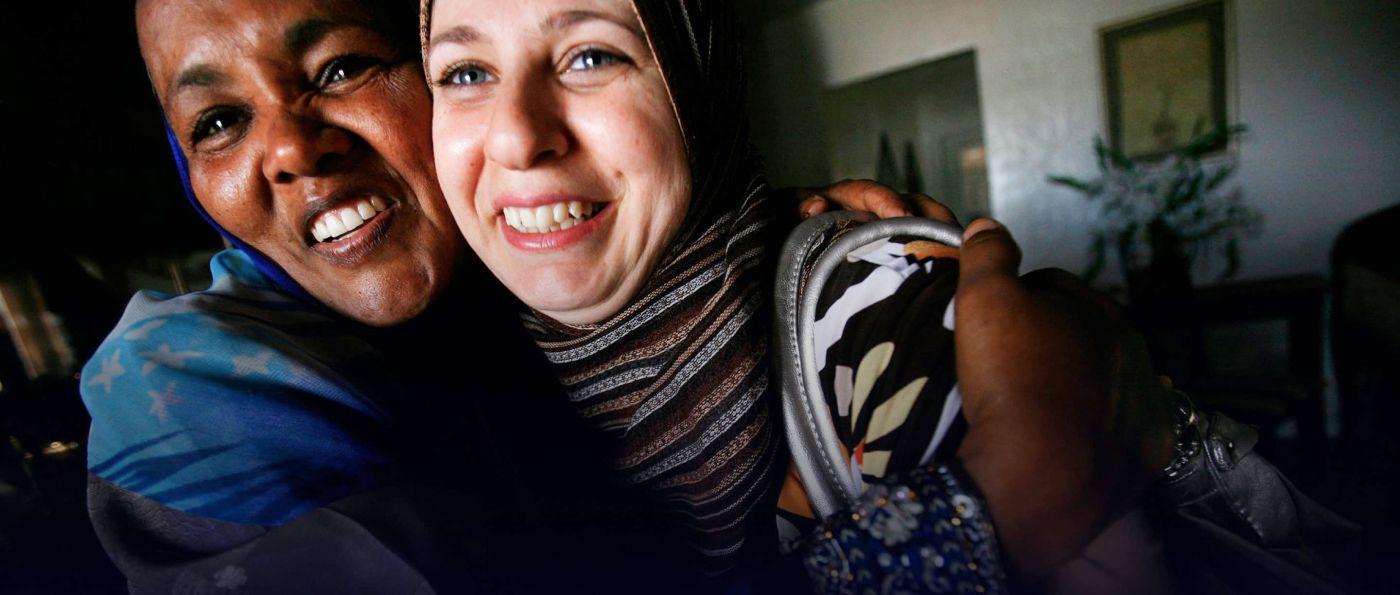

Leaving everything behind in search of a future
“In September (2021), we bought a house, and in February, the war began,” said Anastasiia.
Just five months after purchasing a new home in Mariupol, Anastasiia, Yurii, and their teenage son Kiril found their hometown surrounded by Russian forces. It was clear early on that the young family would need to flee to survive the war.
Mariupol was the first city occupied by Russia within the early days of the invasion.
“The first people who suffered the most during the war was Mariupol… They shot at everyone. People could not leave at all. They tried to leave and immediately fell under fire,” Anastasiia recounted.
The family found themselves living in their house with 13 other people. One person stayed upstairs while the rest hid in the basement “in case they needed to be dug out of rubble from a bomb.”
Snipers perched on roofs and shot at those who tried to escape. There was no clean food or water—people relied on cooking and drinking snow as they lived by the light of their one solar-powered lamp in the basement.
At the time, Anastasiia was working in the local hospital. She witnessed the horrors of war firsthand: Children dying, people burned alive in their apartments, and locals desperately killing each other for food. Bullets flew past her in the street as battles ensued. The physical and psychological trauma was severe.
After a month of living in an active war zone, a near-death experience drove the couple and their son to flee.
We lived there for [another] month, and when a rocket flew into our house, we had to decide whether to die here or try to get out of the city.
The couple didn’t know it at the time, but they would soon discover that Anastasiia was pregnant.
They managed to escape into an area called the Donetsk People’s Republic, or DPR, a separatist entity controlled by Russian forces in eastern Ukraine, and they stayed there in a military camp for two weeks. Life did not get any easier when they arrived in Russia, and they began exploring options to leave the continent.
It was then that Yurii’s sister, who had been sponsored by a Texas-based relative, told the family about the Uniting for Ukraine (U4U) program. While his sister wasn’t able to help sponsor the family, she was able to put them in contact with Keith Mast and his group in Transylvania County, North Carolina.

Keith’s journey into sponsorship began with a deeply emotional response to the unfolding war in Ukraine.
“It wasn't quite a religious experience. Maybe it was a spiritual experience,” he said. “For some reason, I saw what was happening. I just got a feel for what people were going through—just ordinary people, mothers [and fathers] with their kids, homes being destroyed. And I was like, ‘I gotta’ do something.’”
Taking action is my phrase. I want to take action.
Inspired by the generosity of his North Carolina community, Keith created a grassroots initiative called Transylvania County Cares. With seven core couples and a fundraising goal of $20,000, they stepped up to sponsor a family through the Uniting for Ukraine (U4U) program.
Transylvania County, Keith explained, is uniquely suited to welcome new neighbors thanks to its rich community spirit and resources. He emphasized the importance of blending different groups, noting how generosity and need co-exist in ways that allow for powerful partnerships.


His group avoided politics in favor of action and compassion, something he believes resonates more effectively in a politically mixed community such as Brevard.
“Everyone is conflicted about what’s happening in the world,” he said, but, “nobody is talking politics when they meet the family… They’re just wondering, ‘What can I do to help?’”
Let's protect people who've come here legally and who need some assistance, some protection for now. This is a family that needs protection.
When Keith first met the family over Zoom, he described an immediate and powerful connection. He quickly offered sponsorship, submitting applications through USCIS, and once their arrival was confirmed, two friends, Ward and Melinda Johnson, generously offered their home in Brevard. Over the next three months, Keith helped them adjust to living in the U.S.
Only five weeks after arriving in the U.S., Anastasiia gave birth to a baby girl, Nicole. Keith recounted the profound experience of holding baby Nicole for the first time.
“As a single person without kids and a little bit of longing for a family, I literally got a family dropped into my lap… It was just an amazing, amazing experience.” he said.

The family’s first few months in North Carolina were challenging—Yurii and Anastasiia were adjusting to life with a newborn, Kiril started a new school in the U.S., and the family faced language barriers as they struggled to acclimate to a new community. But these issues paled in comparison to living in Russian-controlled Mariupol, and Anastasiia and Yurii shared that the sponsor group helped them “build their new life.”
Anastasiia described their sponsor, Keith, as “our second father.” From attending school sporting events to providing community support whenever he can, Keith has been a constant presence in the family's lives for over three years now.
Today, Anastasiia and Yurii are both working. Kiril is enjoying school, and Nicole, their American-born baby, is now a happy and healthy 2-and-a-half-year-old.
For newcomers like Yurii, Anastasiia, and their children who fled war to build their future in North Carolina, programs like Uniting for Ukraine have become a lifeline. But as policy changes put private sponsorship at risk, their future in the U.S. remains uncertain, and a safe return to Ukraine is not yet an option.
You can help protect life-saving opportunities like those made possible by Keith and Transylvania County Cares. Learn more, and share your support for private sponsorship today.
More stories of welcome





